Could the COVID-19 Spike Protein Be Harming Your Brain?

Despite being primarily a respiratory illness, it became clear early in the pandemic that COVID-19 can also harm the nervous system. In fact, up to 26% of patients report neurological symptoms even 12 months after infection [1]. The symptoms, such as memory loss, impaired smell, and depression, are as diverse as they are debilitating.
Researchers have since explored these reports from multiple angles. A 2022 study published in Nature, for example, found brain atrophy in COVID-19 patients in areas related to smell and memory [2]. Another study published in 2022 identified “Alzheimer’s-like” signaling in the brains of COVID-19 patients [3].
The question is this: what accounts for these symptoms?
A growing body of research suggests that the COVID-19 spike protein plays a key role in causing neurological symptoms. In this article, we will delve into the mechanisms by which the spike protein can affect the brain.
Spike Can Cross the Blood-Brain Barrier
The blood-brain barrier (BBB) is a protective mechanism responsible for controlling the transport of substances from the bloodstream into the brain. It consists of a complex network of specialized cells that form a tight seal around the brain's blood vessels, effectively shielding the central nervous system from harmful substances. Emerging research indicates that the SARS-CoV-2 spike protein can disrupt the integrity of the BBB, facilitating the entry of the virus into the brain [4].
The disruption of the BBB can have severe consequences, as it means that not only the virus but also other harmful substances can infiltrate the brain. The compromised BBB function may contribute to the development of long-term neurological issues in COVID-19 patients such as impaired taste, mental fatigue and confusion, even after recovery from the acute phase of the infection.
Spike Dysregulates the Brain’s Immune Cells
In addition to disrupting the BBB, there is increasing evidence that the COVID-19 spike protein can impair the function of key immune cells called microglia and mast cells in the brain, causing an excessive neurovascular inflammatory response [5]. Microglia and mast cells typically play a crucial role in maintaining brain homeostasis and responding to infections. Once activated by the spike protein, however, these normally protective cells can turn rogue, releasing a range of neuroinflammatory molecules, including cytokines, chemokines, and reactive oxygen species which can cause cellular damage.
Microglia-induced neuroinflammation has huge implications for brain health. It has even been identified in multiple studies as pathological contributor to major depressive disorder [6,7]. Might this in part explain the mood dysregulation reported by many in the wake of COVID-19 infection?
Bottom Line
These findings are just the tip of the iceberg when it comes to COVID-19 and brain health. While much is uncertain, one thing is clear: COVID-19's impact on the brain and body is far-reaching, and more severe than many initially thought.
Related Supplement
The Wellness Company’s Spike Support Formula contains the following ingredients:
- Nattokinase (degrades spike protein)
- Selenium (supports immune and blood vessel function)
- Dandelion root (acts as a detoxifying agent supporting better liver function)
- Black sativa extract (may facilitate cellular repair)
- Green tea extract (provides added defenses at the cellular level through scavenging for free radicals)
- Irish sea moss (could help rebuild damaged tissue and muscle)
References
[1] Cysique, L. A., Jakabek, D., Bracken, S. G., Allen-Davidian, Y., Heng, B., Chow, S., ... & Brew, B. J. (2022). Post-acute COVID-19 cognitive impairment and decline uniquely associate with kynurenine pathway activation: a longitudinal observational study. medRxiv, 2022-06.
[2] Douaud, G., Lee, S., Alfaro-Almagro, F., Arthofer, C., Wang, C., McCarthy, P., ... & Smith, S. M. (2021). Brain imaging before and after COVID-19 in UK Biobank. MedRxiv, 2021-06.
[3] Reiken, S., Sittenfeld, L., Dridi, H., Liu, Y., Liu, X., & Marks, A. R. (2022). Alzheimer's‐like signaling in brains of COVID‐19 patients. Alzheimer's & Dementia, 18(5), 955-965.
[4] DeOre, B. J., Tran, K. A., Andrews, A. M., Ramirez, S. H., & Galie, P. A. (2021). SARS-CoV-2 spike protein disrupts blood–brain barrier integrity via RhoA activation. Journal of Neuroimmune Pharmacology, 16, 722-728.
[5] Theoharides, T. C., & Kempuraj, D. (2023). Role of SARS-CoV-2 Spike-Protein-Induced Activation of Microglia and Mast Cells in the Pathogenesis of Neuro-COVID. Cells, 12(5), 688.
[6] Troubat, R., Barone, P., Leman, S., Desmidt, T., Cressant, A., Atanasova, B., ... & Camus, V. (2021). Neuroinflammation and depression: A review. European journal of neuroscience, 53(1), 151-171.
[7] Brites, D., & Fernandes, A. (2015). Neuroinflammation and depression: microglia activation, extracellular microvesicles and microRNA dysregulation. Frontiers in cellular neuroscience, 9, 476.














